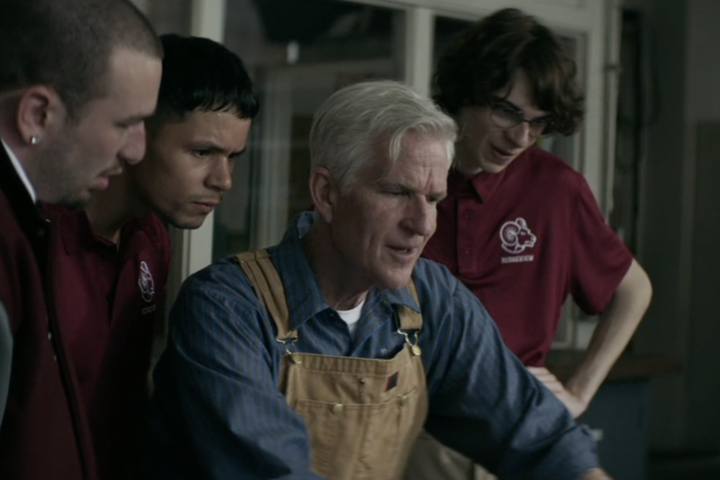Writer-director Leigh Whannell makes art out of pulp in Upgrade, the year’s most inventive and entertaining movie, a mash up of Verhoeven, Cronenberg, Cameron, Crichton and a touch of Clarke. A freewheeling, near future, sci-fi actioner that manages to incorporate a spectrum of influences from B-grade (Black Moon Rising) to A-list (2001: A Space Odyssey), Upgrade never steps wrong, continually topping itself with postmodern ideas cloaked in retro style, presenting a vision of biochemical and AI advances that are less “What if?” than “When?”
Star Logan Marshall-Green is terrific as the analog car mechanic whose wife is brutally murdered and whose quadriplegic body fuses with—naturally—a supercomputer that wants to be human. And an equally good Betty Gabriel is the old-school, intrepid detective out to get her man. Both face off against hardware-enhanced thugs, one mad, conflicted genius and the smartest person in the room, the increasingly sentient AI implant appropriately named STEM, controlling Marshall-Green’s body. It also wants his mind.
Grey Trace (Marshall-Green) is a man out of time, a hard laboring auto mechanic who works with his hands in a near-future world of automated machines. As the picture opens, wife Asha (Melanie Vallejo) returns to their digitally manned home (even meals are made by a robot upon voice command) in a high-tech sportscar retro-reminiscent of the 1986 potboiler Black Moon Rising. This one is outfitted to self-drive, and after an errand to deliver a car to an isolated innovation guru Eron (Harrison Gilbertson), the pair is erroneously diverted to a lousy part of town before being jumped by thugs. Asha is promptly shot to death, while Grey wakes up in the hospital, quadriplegic.
Grey, bitter about his condition, loss and lack of progress by Cortez (Get Out’s Betty Gabriel), a detective on the case, is intrigued when Eron proposes a fix—an implanted AI that will repair his motor functions, restoring his ability to walk—and, naturally, take retribution into his own hands. The AI, named STEM, is reminiscent of a certain computer named HAL, and before long its capabilities are simpatico with both Grey’s mind and body, a near superhuman partnership of man and machine, on the hunt.
For awhile, STEM is a godsend, driving Grey’s body and mind to new heights. But like all classic science fiction AI, STEM wants to evolve, grow and ultimately establish an identity. How the picture navigates this man-machine paradox is intriguing, to say the least, and one of Upgrade’s strong suits is its scientifically sound and quite believable next-gen supposition of our growing reliance on, and relationship to, or with, tech. But we rely on the efficiency and innovation of technology to improve our lives, when is too far? What is lost?
The movie introduces a cadre of slimy villains who have also been outfitted with circuitry enabling them to have, among other things, arms that have morphed into guns. Whannell, lovingly nodding to such 80s classics as Robocop and The Terminator, never loses sight of the personal story amidst the hardware. For all its examination of a plausible world of scientific advances, the picture stays rooted firmly in a believable reality.
Upgrade is nothing if not cautionary. Like The Matrix, it suggests that machines we have created to make our lives easier—cook our meals, drive our cars, enhance investigations—are but a moment away from controlling our minds and bodies, much as James Woods found in David Cronenberg’s 1983 landmark body horror thriller Videodrome, about our obsession with the extremities of media (in that case, early cable television).
Mention should be made of the picture’s innovative fight scenes, where STEM takes full control of Grey’s movements, anticipating each foe’s attacks and furiously dispatching them with lighting fast, robotic precision, captured by cinematographer Stefan Duscio in effective master shots that promote continuity. Upgrade is one stylish, visually innovative ride. In one late scene, a confrontation in the back room of a bar is bathed in red, blue and purple. In another, a long, apartment hallway is lit with broken glowsticks. It’s also well-scored by Jed Palmer with a rich, brooding synth line reminiscent of Howard Shore and Brad Fiedel’s 80s compositions.
At a crisp 90 minutes, Whannell deploys top notch, at times visionary production design and efficient editing that keeps the picture moving at a clip. He also knows, well, not to topple into CGI in a techno-future movie emphasizing practical effects and coherent—imagine that—combat choreography.
Upgrade isn’t just a good genre movie—it’s good, period.
4 stars.



